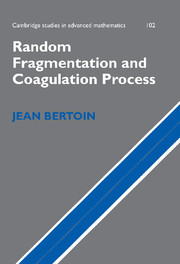5 - Asymptotic regimes in stochastic coalescence
Published online by Cambridge University Press: 07 December 2009
Summary
This chapter is concerned with systems in which particles coagulate pairwise and randomly as time passes. The key assumption is that the rate at which a pair of particles merges only depends on the two particles involved in the coagulation. Although defining rigorously the evolution is easy when there is only a finite number of particles, the extension to systems with an infinite number of particles and finite total mass requires some regularity assumptions on the rates of coagulation. In a different direction, we shall consider the hydrodynamic regime when the total mass of the system tends to infinity. For so-called sub-multiplicative kernels and under appropriate assumptions, the empirical distribution of particles in the system converges after a suitable renormalization to a deterministic measure depending on time. The latter solves a system of non-linear PDEs which is known as Smoluchowski's coagulation equation. The approach relies mainly on combinatorial arguments via a remarkable connection with certain random graphs models. Finally, we pay special attention to the so-called additive coalescent. We shall develop a combinatorial construction due to Pitman, which involves random trees and forests. This provides a key to understanding the asymptotic behavior of such coagulation dynamics when, roughly speaking, the process starts from dust, that is from a large number of small particles.
- Type
- Chapter
- Information
- Random Fragmentation and Coagulation Processes , pp. 214 - 263Publisher: Cambridge University PressPrint publication year: 2006



